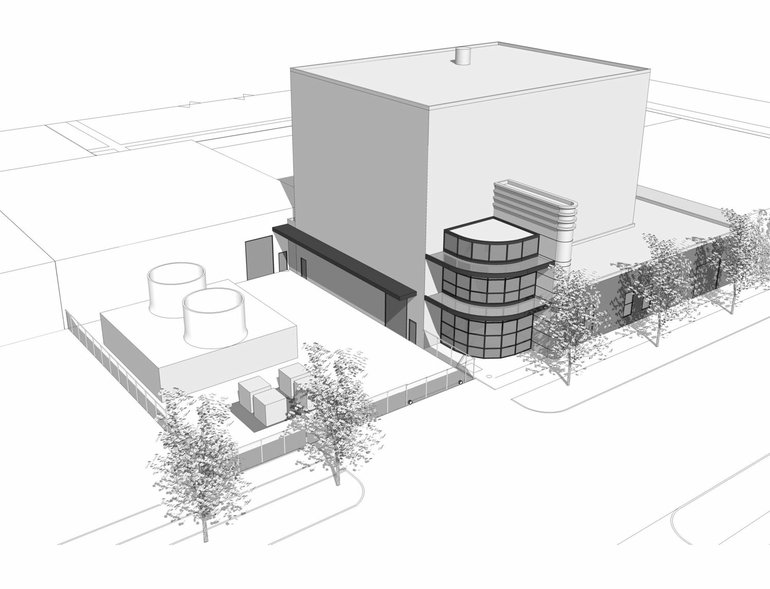Attorneys for Schneider Electric filed a lawsuit against the city of Vancouver in Clark County Superior Court on Monday.
Attorneys Steve Horenstein and LeAnne Bremer allege the Vancouver City Council’s Oct. 10 emergency six-month moratorium on development in the downtown zone violated planning laws and due process by using a moratorium to stop a single project: a proposed biomass-fueled electricity generating plant west of the Clark County Jail.
Schneider Electric has a contract with Clark County to build and operate a biomass plant, which would heat and cool five county buildings, and the company would generate extra electricity that could be sold on the grid.
Meanwhile, opposition to the project continues to mount and county commissioners are taking an extra step to try and limit the county’s liability.
About a dozen protesters plan to attend a county commissioners meeting Tuesday.
The meeting is at 6 p.m. Tuesday at Battle Ground City Hall, 109 S.W. First St. (The meeting is in Battle Ground as an attempt to convenience the public, as the public hearing will be one of two on the updated Shoreline Management Plan).
Protesters will meet at 5 p.m., said Tracy Hill, a Hough neighborhood resident.
The city and county have been at loggerheads over the idea of a biomass plant at West 11th and Harney streets almost since it was first proposed.
City leaders — and downtown neighborhoods — have cited concerns about pollution, odor and traffic. They’ve also said that the city’s vision for downtown is to move away from industrial uses to more commercial and residential development.
The county has maintained that pollution and other factors would be minimal, and that the plant represents a sustainable way to heat and cool county buildings at no additional cost to taxpayers.
The biomass plant (fueled by tree tops, limbs and the detritus of producing lumber) would replace 11 fossil fuel boilers.
New opposition group
Hill said a new coalition has formed, Clark County Clean Air, to convince commissioners a biomass plant would be a source of unacceptable pollution.
Commissioner Steve Stuart, who voted against the project, said commissioners have received correspondence from concerned citizens.
“Commissioners are listening,” Stuart said Monday. Referring to the commissioners who supported researching the possibility of a plant — Marc Boldt and Tom Mielke — Stuart said, “they are researching those concerns.”
Under the county’s contract with Schneider Electric, the county will be liable for Schneider Electric’s costs, up to $395,000, if it pulls the plug.
At this point in the project, the county would be liable for expenses up to $225,000.
In a memo this week to David Palmer of Schneider Electric, Clark County Administrator Bill Barron wrote that “the land use permitting issue became more complicated than either party anticipated. Because of the uncertainty surrounding these issues and the multiplicity of legal options that currently exist, Clark County would like to suggest a ‘pause’ in development activity.”
“Specifically,” Barron wrote, “we would like to suggest the following: For a period of 90 days from the date of this memorandum (Nov. 1), either party may terminate the project. In the event that the county terminates the project during the 90 day period, it will not be liable for expenses over and above the $225,000 triggered by the acceptance of Deliverable No. 2.”
That “Deliverable No. 2” — detailed plans for the plant — was signed off by Barron on Monday.
City lost hearing
In August, Vancouver Planning Review Manager Chad Eiken said a biomass plant was not allowed in the light industrial overlay of the city center district. Schneider Electric appealed.
On Oct. 12, two days after the council passed the moratorium, a hearing examiner sided with Schneider Electric. The hearing examiner, Sharon Rice, an attorney from Shoreline, wrote that the “use would be consistent with the intent and purpose of the applicable zoning district.”
Rice wrote that “the use is expected to generate about 50 trips per day, half truck and half passenger vehicle. Emissions would be regulated and air quality requirements enforced by the Southwest Clean Air Agency.”
Rice wrote that the proposed biomass plant would have a lower combustion source capacity than the existing Frito-Lay plant and the SEH America silicon wafer manufacturing plant.
“The record contains no evidence that suggests substantially greater impacts in any regard than the existing and permitted uses in the vicinity,” she wrote.
In the lawsuit filed Monday, attorneys for Schneider Electric want a judge to rule the moratorium invalid and order the city to accept paperwork related to the biomass plant.
Vancouver City Attorney Ted Gathe said Monday that he has reviewed the lawsuit.
“The lawsuit is at best premature because the city council is required by law to hold a public hearing on the moratorium which has not yet happened,” Gathe said. “We intend to vigorously defend the city against these claims.”



